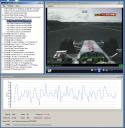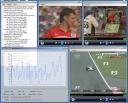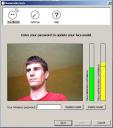Interesting kickstarter project using computer vision: AR-Pinboard
UrbanScreen 3D Building Projections
UrbanScreen specialise in capturing the 3D dimensions of a building and then producing custom projections whith stunning results. From the UrbanScreen website:
“Large-scale projection on urban surfaces – this is our creative-company’s field of activity. We conceive and produce custom-made media installations using high artistic standards and stylistic devices, a spacious architectural background and a consistently professional completion; in doing so, creating uniquely outstanding impressions.”
Lagoa Multiphysics Engine
The Lagoa Multiphysics 1.0 is a fantastic physics engine designed and written to replicate the laws of real life physics in a digital environment in an ultra realistic way. The full blown engine currently won’t run in real time but produces some truely amazing particle simulations.
The engine has been developed by Thiago Costa. Check his website for some other high quality simulation developments.
Sopcast Sports is a sopcast GUI tailored to watching live sport events using the sopcast protocol. Using game data supplied by myp2p.eu. Live sporting events are presented in an easy to use interface written in c# using the .net framework.
Sopcast sports requires the latest version of the official sopcast client to be installed. This software is free and can be downloaded from the sopcast homepage.
 |
 |
Sopcast sports is deployed and updated using Microsoft ClickOnce technology. Clicking on the following link will install Sopcast Sports under Internet Explorer 6 and later. Firefox users may require the following extension: FFClickOnce
SopcastSports is a Tcl/Tk GUI for the linux version of sopcast tailored towards watching live sporting events. SopcastSports strips live game information from the web (www.myp2p.eu) and presents a list of sopcast streams, sorted by game, to the user. SopcastSports allows the viewing of multiple simultaneous streams and provides greater information regarding the status of the stream than other sopcast clients.

|

|
If you use sopcast primarily for watching sporting events or simply dislike using sopcast on the command line then this application may be of use to you. Feel free to modify the code and redistribute as you see fit, however, please share any updates to the code you make with the community. I wrote SopcastSports in a couple of afternoons so it’s far from perfect – if you find and fix any bugs or code any improvements I would love to hear from you.
Requirements for running SopcastSports:
- SopcastSports Tcl/Tk Files
- Tcl/Tk interpretor (tested against tcl/tk 8.4)
- The Tix library for Tk
- sp-sc (linux sopcast client)
- mplayer
- wget
All these applications are available from the Synaptic Package Manager or equivalent with the exception of the SopcastSports files which can be downloaded via the link above.
Banana Screen
 Banana Screen is an interesting little application that allows you to lock and unlock your computer using face recognition. The application is simple to setup and use and makes unlocking your computer faster than having to type a password each time you sit down.
Banana Screen is an interesting little application that allows you to lock and unlock your computer using face recognition. The application is simple to setup and use and makes unlocking your computer faster than having to type a password each time you sit down.
The program is currently in beta so expect improvements in the coming months. At the moment the balance between ease of use and accuracy is not quite right. The application allows you to register a number of different face models which allow recognition under a variety of lighting conditions and face poses, however, I’ve found that if you over train the model the systems tends to produce far too many false positives. If the model is under-trained then lighting conditions at different times of the day tend to produce too many false negatives. Furthermore the lack of control over which input images are used as a part of the recognition model means that in order to correct the under-training or over-training issues the whole face model must be deleted and training started from scratch. The forums suggest that people at Banana Screen are working on these problems though so whilst at the moment it is not secure enough to replace traditional password entry in environments where security is of particular importance it is an interesting toy for the home PC user. Hopefully the transition for toy to security application will come as the program matures.
Read the rest of this entry »
Ron Fedkiw: Computer Graphics Simulations
 This is more computer graphics than vision but the videos on Ron Fedkiw’s home page are simply amazing.
This is more computer graphics than vision but the videos on Ron Fedkiw’s home page are simply amazing.
Fedkiw received his Ph.D. in Mathematics from UCLA in 1996 and did postdoctoral studies both at UCLA in Mathematics and at Caltech in Aeronautics before joining the Stanford Computer Science Department. He was awarded the National Academy of Science Award for Initiatives in Research, a Packard Foundation Fellowship, a Presidential Early Career Award for Scientists and Engineers (PECASE), a Sloan Research Fellowship, the ACM Siggraph Significant New Researcher Award, an Office of Naval Research Young Investigator Program Award (ONR YIP), a Robert N. Noyce Family Faculty Scholarship, two distinguished teaching awards, etc. Currently he is on the editorial board of the Journal of Computational Physics, Journal of Scientific Computing, SIAM Journal on Imaging Sciences, and Communications in Mathematical Sciences, and he participates in the reviewing process of a number of journals and funding agencies. He has published over 80 research papers in computational physics, computer graphics and vision, as well as a book on level set methods.
Read the rest of this entry »
 From the Reactable homepage: “The reactable is a collaborative electronic music instrument with a tabletop tangible multi-touch interface. Several simultaneous performers share complete control over the instrument by moving and rotating physical objects on a luminous round table surface. By moving and relating these objects, representing components of a classic modular synthesizer, users can create complex and dynamic sonic topologies, with generators, filters and modulators, in a kind of tangible modular synthesizer or graspable flow-controlled programming language.”
From the Reactable homepage: “The reactable is a collaborative electronic music instrument with a tabletop tangible multi-touch interface. Several simultaneous performers share complete control over the instrument by moving and rotating physical objects on a luminous round table surface. By moving and relating these objects, representing components of a classic modular synthesizer, users can create complex and dynamic sonic topologies, with generators, filters and modulators, in a kind of tangible modular synthesizer or graspable flow-controlled programming language.”
Read the rest of this entry »
Computers outperform humans at Face Recognition
 The recently released results of the Face Recognition Grand Challenge now show that computers are capable at outperforming humans in face recognition tasks. The recent match up of face-recognition algorithms showed that machine recognition of human individuals has improved tenfold since 2002 and a hundredfold since 1995. Indeed, the best face-recognition algorithms now perform more accurately than most humans can manage. Overall, facial-recognition technology is advancing rapidly.
The recently released results of the Face Recognition Grand Challenge now show that computers are capable at outperforming humans in face recognition tasks. The recent match up of face-recognition algorithms showed that machine recognition of human individuals has improved tenfold since 2002 and a hundredfold since 1995. Indeed, the best face-recognition algorithms now perform more accurately than most humans can manage. Overall, facial-recognition technology is advancing rapidly.
Check out Mark Williams’s article for the Technology Review for a rundown of some of the entries for the grand challenge. This story was also recently covered on slashdot.
Synthesis of video realistic facial animations
One of my colleagues (Leif Oppermann) recently visited the 2007 game developers conference and told me about some quite amazing work by Silicon Studio. Their Motion Portrait software uses model based reconstruction to create a 3D head model from a single frontal image of a subject. The model is then fully animated and capable of a wide range of human expression.
This is exactly what I’m trying to achieve at this stage of my research. Shame this blows anything I’m likely to be able to construct out of the water!
Check out the video below for a demonstration from the show.
Read the rest of this entry »
-
You are currently browsing the archives for the Interest category.